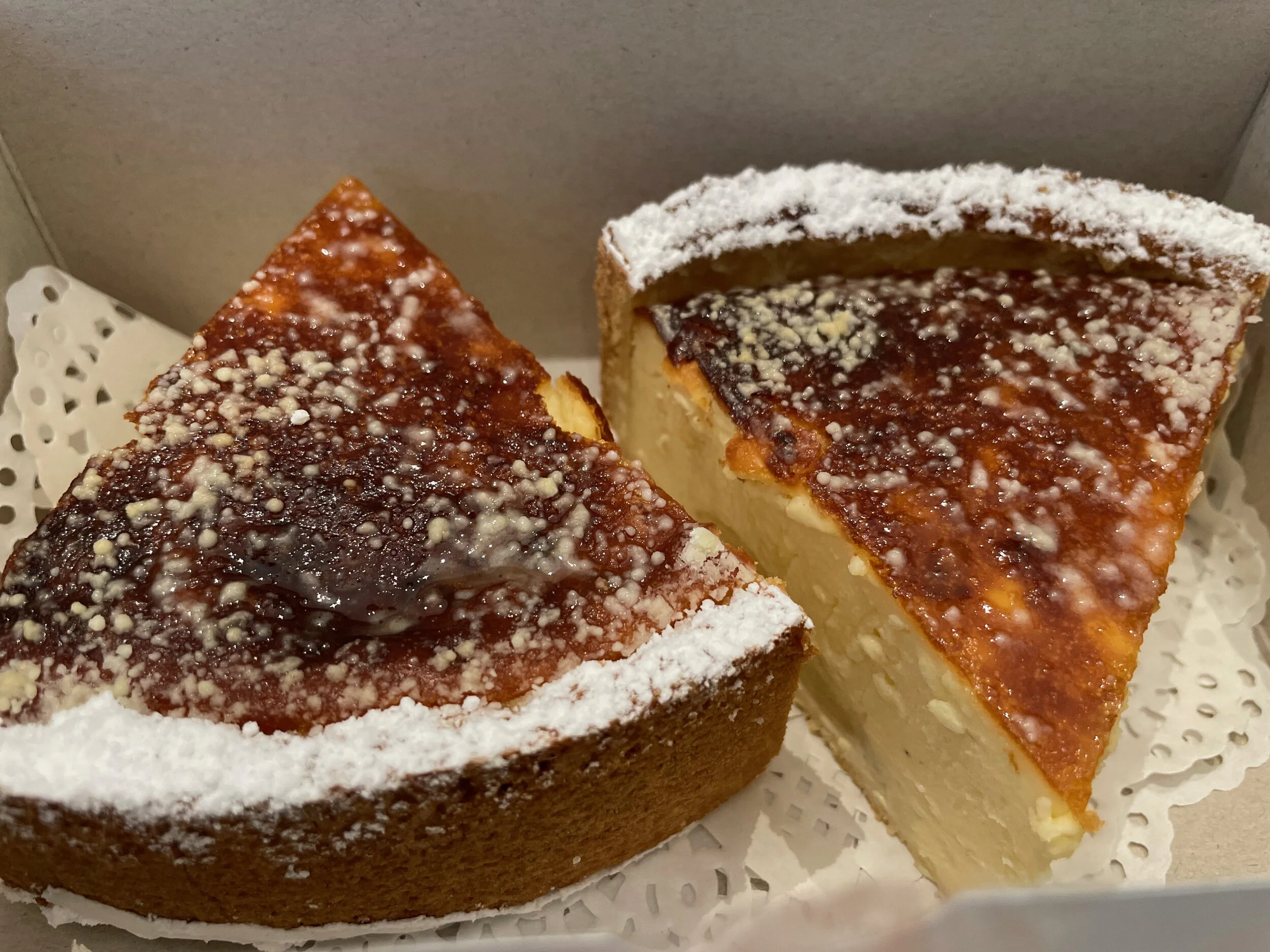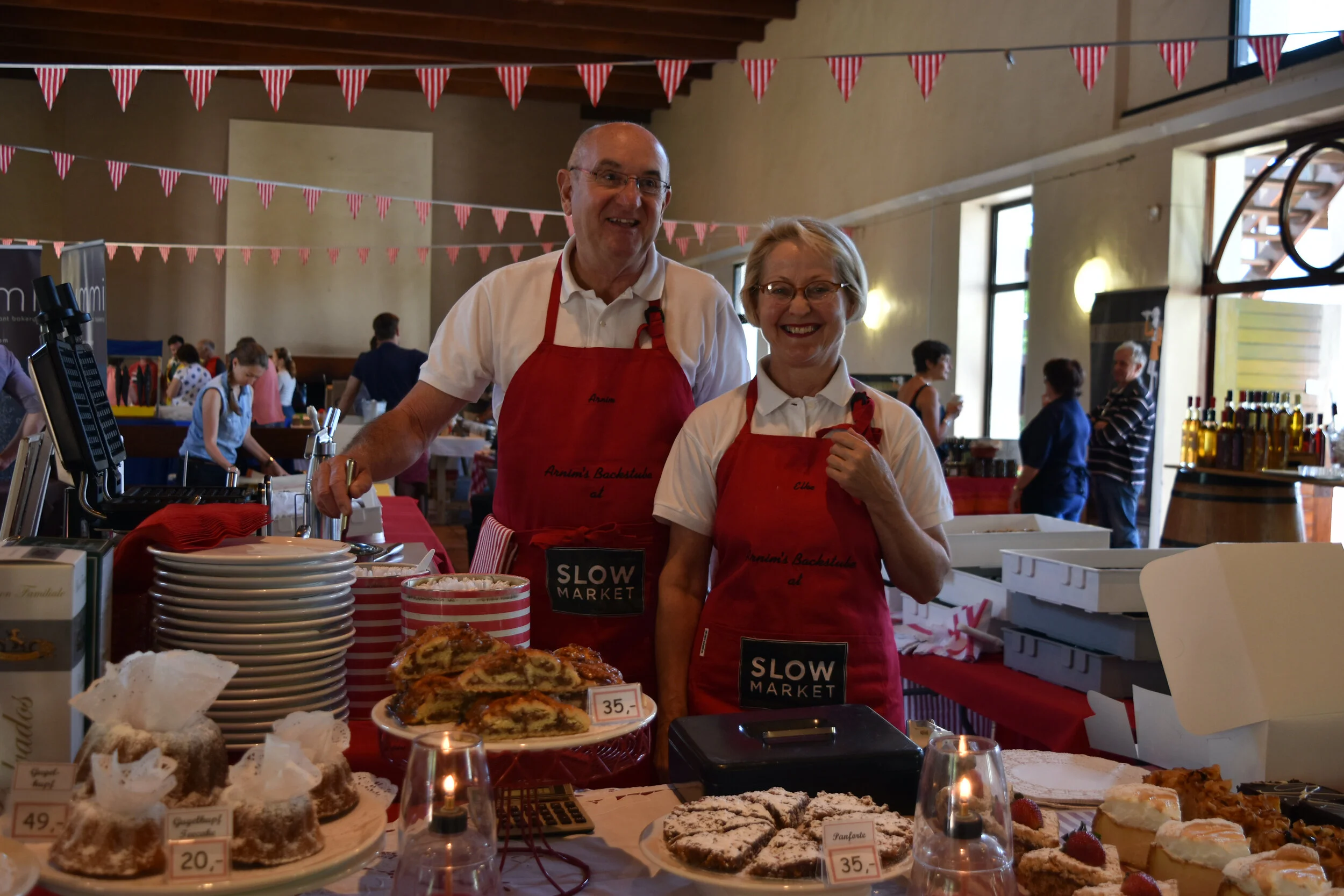Last week I bought almost eight hundred rands worth of cake. You may gasp at the sheer volume of that indulgence. But there is a reason for it and a history behind it.
Over a decade ago, my father started to shop at the weekly Slow Food Market in Stellenbosch at the Oude Libertas Theatre. He would be one of the first clients to arrive at the market as some traders were still setting up, with his baskets in hand, doing his rounds, buying wine, fresh salads, spicy samosa’s, home-made jam and smoked trout. He loved to greet the pretty lady who sold salt, sometimes with a smoochy kiss. Everybody waved to him and inquired after his health as he did his routine loop around the hall. But the highlight was freshly baked cake, prepared by a German couple, Elke and Arnim. He would buy three large pieces: apricot or cherry crumble, lemon meringue-topped cheesecake, dark chocolate squares or pale, fluffy, creamy bee-stings, and Elke would place them in a white cardboard box which he carried home. He divided each slice in two and would have one after supper through the week, a ration of delight.
Cherry crumble and lemon cake
As his ability to function slipped, and he was no longer able to drive himself, getting him to the market became one of my weekly challenges. With two small children, and a full-time job, it was tricky to drive from Cape Town to Stellenbosch every Saturday to take him shopping. So we paid people to take him, principally for the act of buying his own cake and because the warmth of the traders and the interest they showed him was as good a therapy as any lonely person might have.
Arnim and Elke - bakers of fine German Cakes
The cake-bakers have become loyal friends, always making my father feel very special, despite his increasing dementia. When we moved him into our household, the market tradition continued, and the two of us would set out early on a Saturday with baskets and cash, coming home laden with treats for him and for me. I found myself walking away with cake for my family as well. We were very good customers.
COVID closed the market, and all those delicacies disappeared from our diet, as did the outing from my father’s routine. Once every two months or so, Elke and Arnim text me to say they are baking and I buy in bulk and pick up from their home, putting most in the freezer to use up over time. My last purchase included a nutty, home-made stollen and boxes of cherry crumble. When I serve the cake to my father his eyes light up, and his memory is triggered. It’s not quite a Proustian Madeleine moment, but with prompting, he says he can vaguely remember the couple who baked the cake, and the prospects of eating the treat infuses him with contentment. This is because there is not much left to animate him beyond his relationship with food and drink.
Even if the market were to re-open, I would not take him because it would overwhelm him. And he is unable to manage his cake anymore. It’s become a marker of decline. If I leave the cake in his fridge over night, it is mostly gone in the morning, eaten in a rough and ready way, gouged with an implement in the middle of the night. He has no restraint left, just a raw appetite for good things.
My older sister, a medical doctor, talks to me about the tea and toast diet, which elderly people often drift to when it becomes overwhelming to think of preparing and eating proper meals. For a long time my father held on to his sense of meal time, but knew, like our pets, that its source was me. From about six in the evening, for example, he would start to circle, wanting to know when dinner would be served and he would become agitated if it were late. We called him the white shark. I have tried to draw him into the preparation of the food. Sometimes I can get him to top and tail the beans but his attention wanders and then so does he.
This last year, lunches, breakfasts and suppers became muddled up. But he seldom turns down a meal, and mostly eats all of it. When he was younger, he was fastidious about not eating between meals. Now he craves sweet things all the time - biscuits, cakes, chocolate and fruit juice. I have learnt that seniors lose their acute sense of taste, making exaggerated sweetness and saltiness more significant in their enjoyment of food.
I think he eats too out of sheer boredom. Once or twice a day, he loops around the house, always the same route, back through the lounge, into the kitchen and past the fruit bowl. When he thinks I am not looking, he takes a banana, sticks it into his pocket and treks up to his apartment to eat his treasure. I find the skins all over the place, even in the bathroom. Bananas are healthy options for older people because they have lots of potassium so I am not complaining too much, although I mumble about imposing a banana tax on him when I see the bowl has been raided yet again and we have no bananas left for breakfast.
But it’s the cake that really brings a twinkle to his eye: it maintains a tenuous link to happier times past - le temps perdu - when he was able to shop, and chat and manage his own pleasures.
Copyright Marion Edmunds 2021


